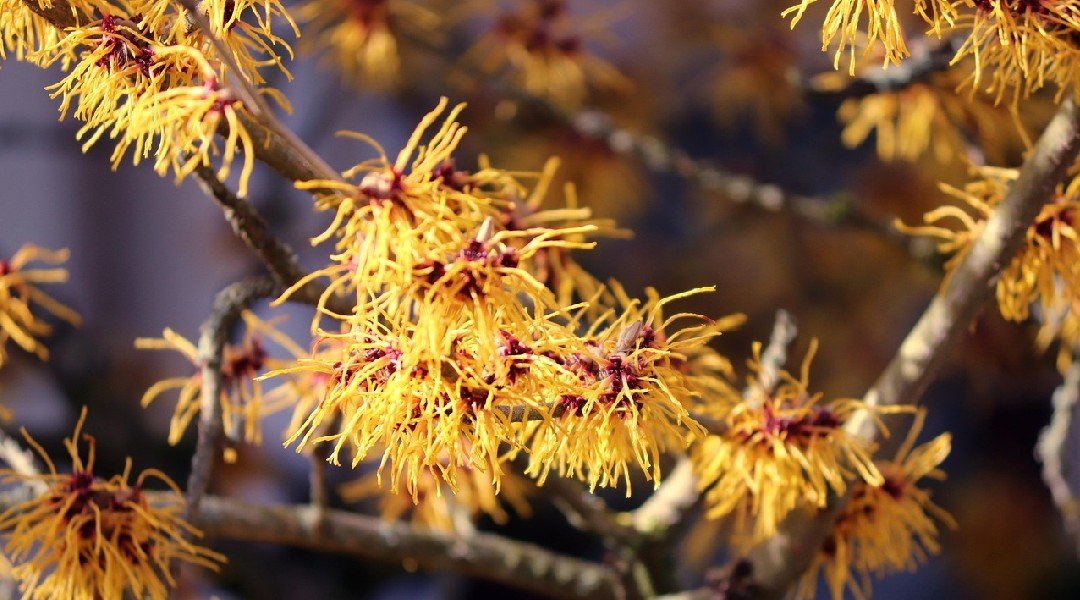Witch Hazel: The Timeless Elixir Your Skin Will Love

Shea Butter for Skin: The All-Natural Moisturizer Your Skin Will Love
December 31, 2024
Winter Face Cream: Your Skin’s Cozy Blanket Against the Cold
January 14, 2025Witch hazel—the name surely sounds like it belongs in a spell book. But the truth is that it is a skincare hero that doesn’t get nearly enough credit. For centuries, people have turned to this ingredient for everything. From calming angry breakouts to soothing irritated skin, this ingredient does it all beautifully, like an all-arounder.
In this article, we have explored this magical ingredient’s benefits, side effects, and safe usage practices. So, let’s get started!
The Top Skin Benefits of Witch Hazel
Witch hazel is the newest magic potion that has recently entered the skincare market. It is an astringent which has anti-inflammatory and antiviral properties. Let us now explore the witch hazel uses and benefits:
- Offers Relief from Inflammation: Inflammation is a natural immune reaction that signals an injury or infection. Witch hazel contains compounds, including gallic acid and tannins, that have anti-inflammatory properties. It also contains antioxidants that prevent the spread of infection. As a result, it is capable of treating some skin diseases, such as acne, eczema, or psoriasis.
- Minimizes Skin Irritation: People with sensitive skin often experience skin irritation. Witch hazel can help in this case by reducing irritation and calming inflamed skin. Research has shown that it suppresses erythema by up to 27%.
- Fights Acne: This ingredient’s powerful antioxidant and anti-inflammatory properties make it an excellent ingredient for treating acne. For maximum effectiveness, you can either apply it directly to your face after cleaning or steaming it. As a result, it helps shrink your pores while soothing your skin and offering relief from inflammation.
- Cures Scalp Sensitivity: Scalp sensitivity is caused by various factors, such as heat stylings, dandruff, or other conditions like psoriasis or seborrheic dermatitis. Applying a little amount of witch hazel to the scalp before hair washing may help treat scalp sensitivity and provide relief from itching and tenderness. According to a study, around 1,373 people using shampoo containing witch hazel got relief from scalp irritation.
- Shield Against Skin Damage: The tannin in witch hazel protects your skin against damage when applied topically. Tannin is a natural plant compound with powerful antioxidant properties. It acts as a barrier that prevents inflammation-causing substances from entering your skin cells.
- Anti-Aging Properties: Witch hazel is rich in antioxidants. These antioxidants act as the unsung heroes when protecting your skin. It can effectively prevent premature aging with consistent use. You may also observe a significant reduction in the appearance of fine lines and wrinkles by using it regularly.
- Balance Skin pH: Witch hazel is a therapeutic ingredient. It is almost like a magic potion that addresses several skin concerns and heals them from within. It also maintains your skin’s natural pH levels, which is essential for achieving healthy and resilient skin.
Does Witch Hazel Have Side Effects?
Although this skincare ingredient comes with many benefits, from fighting acne to preventing premature aging, it does it all like an allrounder. However, it is also important to know if it has any possible side effects. Let’s have a look at some of the probable side effects of it:
- Allergic Reactions: This ingredient is usually safe to apply. However, some people may experience allergic reactions, such as itchiness, redness, and inflammation, after applying it. As a result, it is always better to perform a patch test before buying a new skincare product.
- Sensitivity to Alcohol-Based Formulations: Some commercially available witch hazel may also contain alcohol in it. However, some people might be sensitive to it and experience skin irritation.
- Eye Irritation: Applying the ingredient too close to your eyes may cause irritation, redness, discomfort, and watering.
How to Use This Ingredient Safely?
Follow these simple tips to avoid the side effects and use it safely:
- Perform Patch Test: Take a little amount of this ingredient and apply it over a small area of your skin. Wait for 24 hours and see if there is any reaction.
- Choose Alcohol-Free Formula: Choose a gentle and alcohol-free formula to avoid skin irritation and dryness.
- Avoid Overuse: Limit your application once or twice a day to avoid skin dryness and side effects.
- Consult a Professional: The safest thing to do is consult a dermatologist before using this ingredient.
FAQs:
Does witch hazel expire?
Yes, the commercially available products containing witch hazel do have a particular shelf life and they expire post that date.
Is witch hazel good for acne?
Yes, witch hazel contains antioxidant and anti-inflammatory properties that can fight acne.
Also read: Sensitive Skin Care Tips: Tricks to Keep Your Glow Without the Drama





